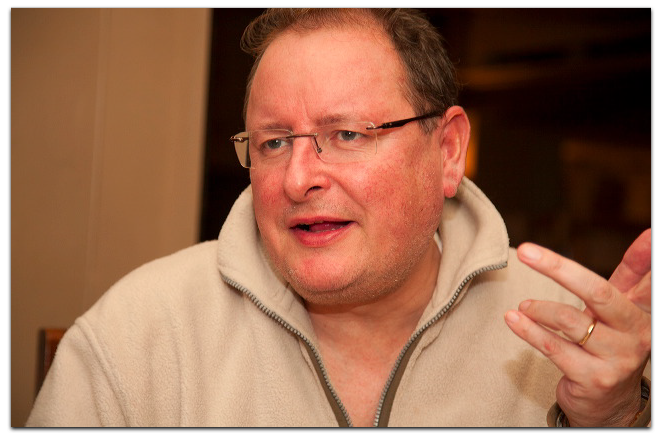
Live as if you were to die tomorrow. Learn as if you were to live forever.
— Mahatma Gandhi
I’m not sure if Gandhi actually said that. Somebody did. My best human chance of finding who said it — or at least of gaining a learned enlargement on the lesson — would have been David Sallis. “Big Davy” didn’t know everything, but he came closer than anybody else I know, and he was a living exemplar of Gandhi’s advice.
Davy’s answer would have been knowing, clever and enlarged by a joke, a wild story or both. Alas, I can’t ask him, because he died last Friday of a stroke he suffered a few days earlier. He was just 56, and is survived by his wife Margaret and daughter Rosie —
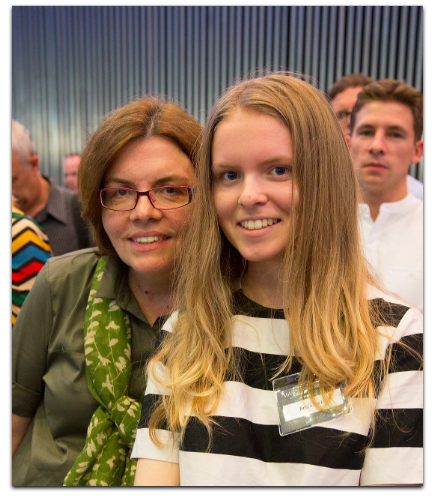
— both of whom he adored absolutely — and by countless friends and colleagues who remain shocked and saddened by his passing.
I caught a telling example of how much Davy knew when he was visiting in Santa Barbara for the first time a couple years ago, and we took a long walk downtown. Observing the distinctive typeface of the city’s street signs, he described in depth its origin and design elements. I don’t remember what he said, except that the typeface, like the town, was of regional Spanish provenance. Now when I look online, all I can find about the typeface is that it’s called “Mission,” and lives in no standard font library. Whether or not Davy knew more than the rest of the world on the subject, it was totally in character that he might.
Davy didn’t like it when I told other people he was a maths genius. A stickler for accuracy, he said he was taught by some real ones, at Imperial College and elsewhere. But while he might not have been their equal, he was wickedly smart on the topic. One evening I saw that demonstrated at a bar in Silicon Valley. Davy was sitting at a table with another maths whiz, talking about how to solve some particularly vexing problem. Pausing in the midst of the conversation, Davy folded a napkin several ways at various angles and pushed it across the table to the other guy, who said “That’s it!” and looked back at Davy in amazement. Davy returned a look of agreement with one raised eyebrow and a wry smile. It was an expression that at once said both that he had won and this was all in fun — and “Isn’t it great that we’re both learning something here?” Here’s a photo I shot of the scene:
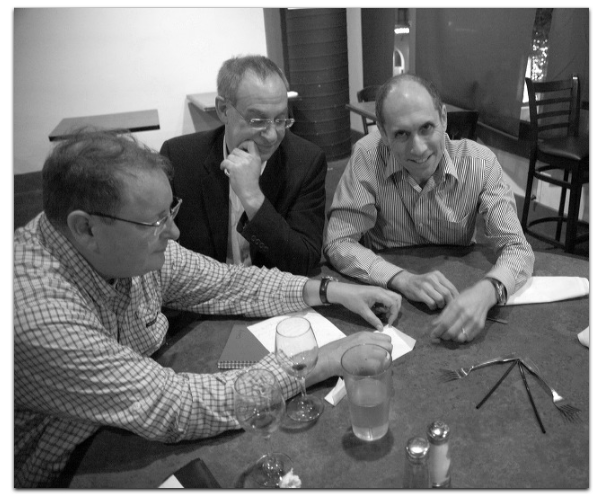
Davy was also a lover and player of music. Here he is on a guitar he brought to our house on a visit:
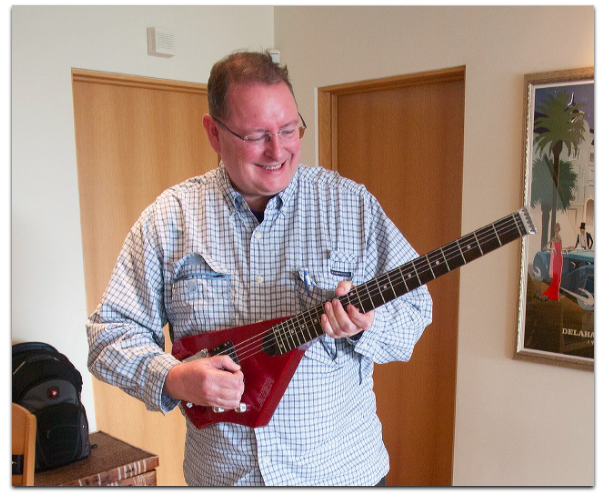
Davy’s tastes were wildly eclectic and refined. That guitar is an Erlewine headless Lazer — the same one played by Johnny Winter. At the time it was on its way to joining Davy’s extensive collection of vintage saxophones and guitars of every kind, any of which he might pick up and wail away on at a moment’s notice. He could hold forth on Bach and punk with equal authority, and had forgotten more about Frank Zappa than all but a few will ever know. Here he is with our friend Robert Spensley (another fabulous musician), in their Zappa shirts:
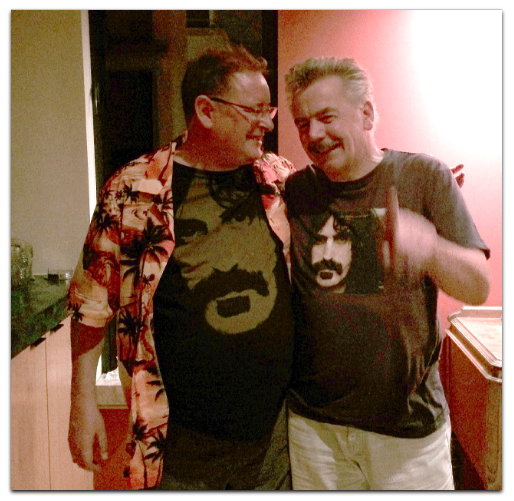
Davy became instant friends with my wife and I when we met in London in May 2013, at a lunch with a handful of colleagues at Visa Europe, which employed his consulting services for many years. It was Davy who brought VRM (subject of my work with the Berkman Center) to the company’s attention, and who had been the main instigator of the gathering.
Suspecting that we might be among the few who would know a world-changing business and technical hack when we saw one, he shared with us plans for Qredo, an architecture for sending and sharing data securely and privately between parties who could also, if they chose, connect anonymously — and then selectively disclose more information as purposes required. Qredo eventually became a startup, and I served through its formative months on the company board, visiting often to Richmond, Davy’s beloved home town. Here he is, describing how Qredo fit into some VRM contexts :
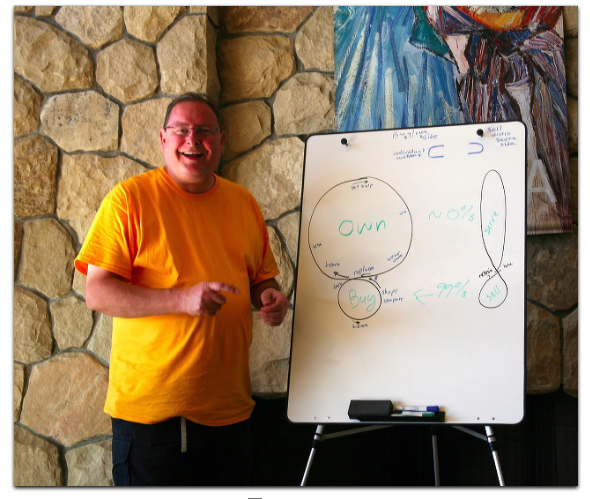
Yet what I love and remember best about Davy was how much fun he was as a companion — at work on Qredo, in conversation at pubs and in other convivial settings, on walks in Richmond and around London, and over countless meals in places both fun and fine. To all those occasions Davy brought the most irrepressible inner child I have ever known in an adult human being. Here is a small collection of shots that show our boy at work and play:
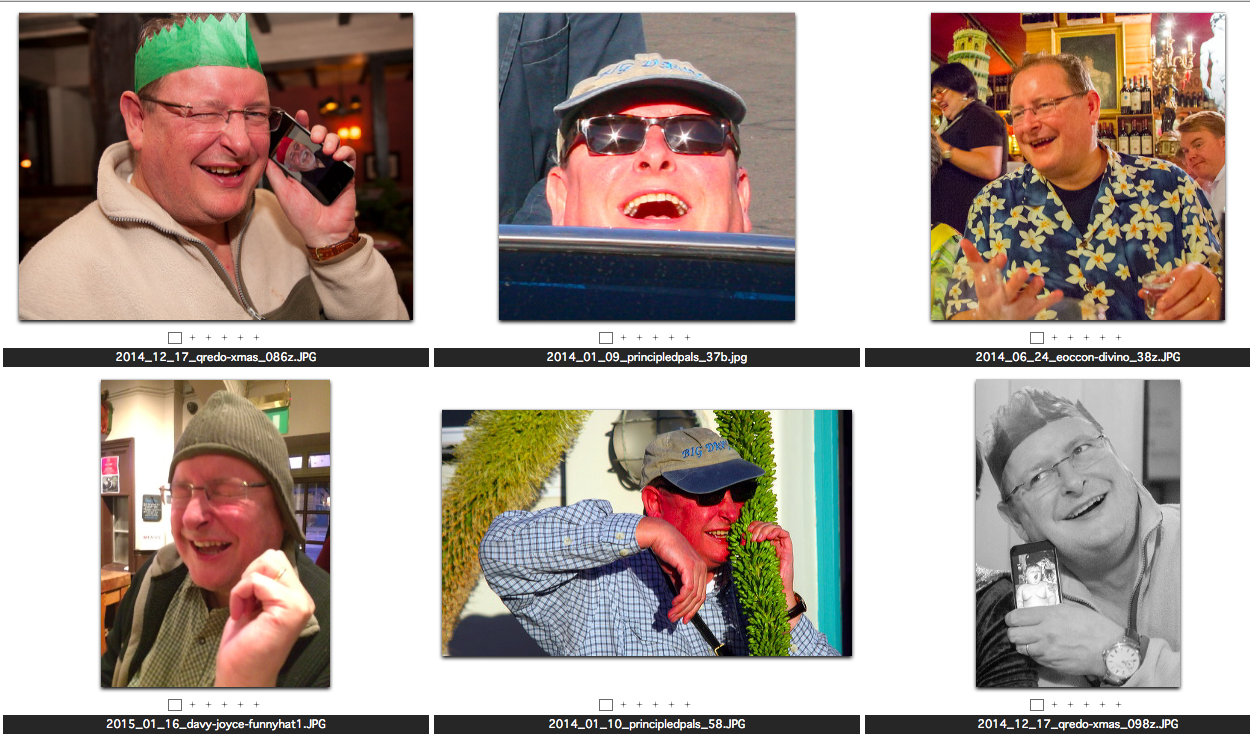
Since he left I haven’t gone ten minutes without lamenting how much his absence lessens the world. The one solace I find is knowing how much larger he made the world when he was with us.
For those able to attend, a ceremony and burial will be held on Monday, 30 November, 11 AM at Richmond Cemetery.
Leave a Reply